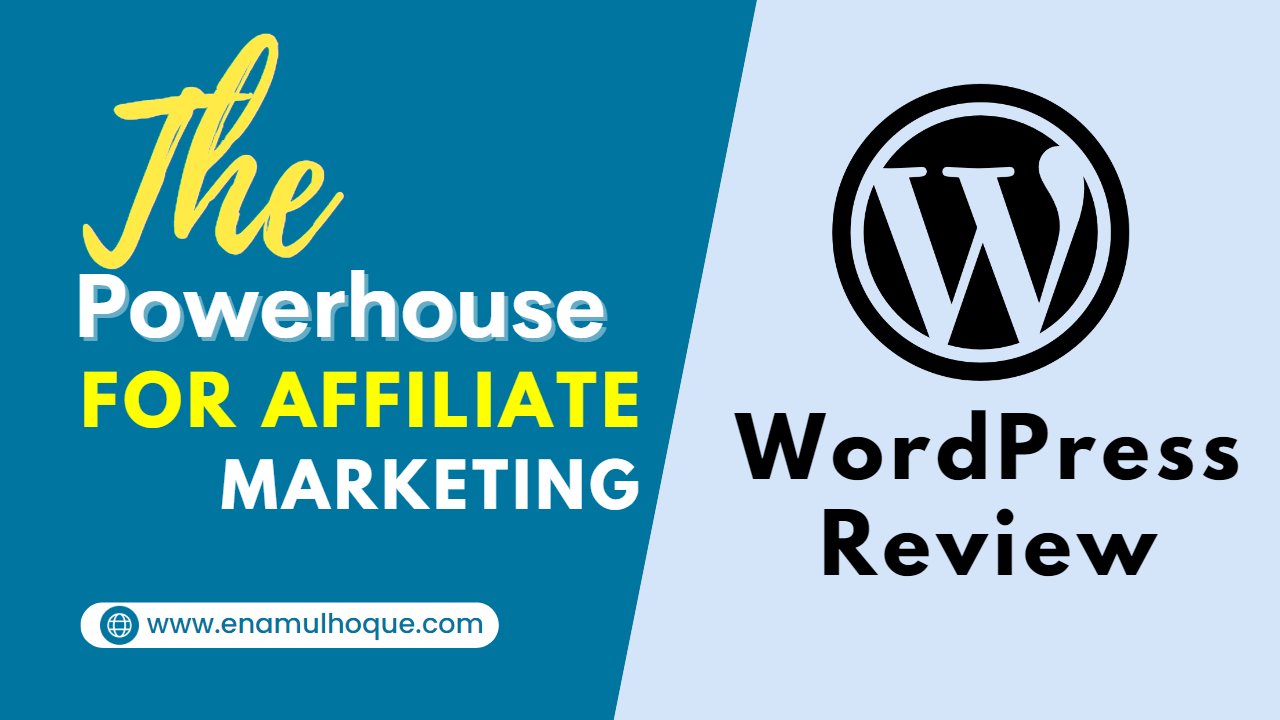Affiliate marketing has become a lucrative endeavor for many individuals and businesses. It allows people to earn passive income by promoting products or services and earning a commission for every sale or lead generated through their referral. To excel in affiliate marketing, one needs a robust platform that provides flexibility, customization options, and powerful tools for optimization and monetization.
This article will explore how WordPress, the world’s leading content management system (CMS), can revolutionize your affiliate marketing efforts. With its user-friendly interface, extensive plugin ecosystem, and unparalleled customization capabilities, WordPress offers everything you need to build a successful affiliate marketing website.
My Best Recommended & Proven Way to Make $100-$500 Per Day – Watch THIS FREE Video to START >>
Why WordPress is Ideal for Affiliate Marketing
- Flexibility and Customization
WordPress is renowned for its flexibility and customization options. It provides a vast selection of themes and templates, allowing you to create a visually appealing website that aligns with your branding and product promotions. WordPress offers the tools to make your website stand out, whether you’re promoting fashion, technology, or any other niche.
- User-Friendly Interface
Not everyone is a tech expert, and that’s where WordPress truly shines. Its intuitive and user-friendly interface empowers beginners to create and manage their affiliate marketing websites effortlessly. With its drag-and-drop functionality and easy content creation, you can focus on delivering high-quality content rather than grappling with complex technicalities.
- Extensive Plugin Ecosystem
WordPress boasts an extensive plugin ecosystem, offering specialized tools for affiliate marketers. From managing affiliate links and tracking clicks to generating reports and optimizing your content, plugins are available to simplify and streamline every aspect of your affiliate marketing strategy. You can customize your website to meet your specific requirements and enhance its functionality with just a few clicks.

Optimizing Your WordPress Website for Affiliate Marketing
Optimizing your WordPress website is crucial to maximizing your success in affiliate marketing. Here are some essential steps to follow:
- Choosing the Right Theme for Affiliate Marketing
The theme you choose plays a pivotal role in the success of your affiliate marketing efforts. It should be responsive, fast-loading, and SEO-friendly. Look for themes specifically optimized for affiliate marketing and provide seamless integration with affiliate plugins.
- Implementing SEO Best Practices
Search engine optimization (SEO) is paramount for driving organic traffic to your website. Conduct keyword research, optimize your content, and leverage SEO plugins to improve your website’s visibility in search engine results pages. Implementing SEO best practices can attract more targeted visitors to your affiliate offers.
- Leveraging Affiliate Marketing Plugins
WordPress offers a wide range of plugins that cater specifically to affiliate marketers. These plugins help you manage and organize your affiliate links, track clicks and conversions, and optimize your content for better conversions. Choose plugins that align with your requirements and integrate seamlessly with your WordPress website.
Essential WordPress Plugins for Affiliate Marketing Success
Regarding affiliate marketing on WordPress, certain plugins are indispensable for success. Here are some must-have plugins:
- Affiliate Link Management Plugins
Affiliate link management plugins simplify managing and organizing your affiliate links. They provide features like link tracking, redirection, and link cloaking, making it easier to track the performance of your affiliate campaigns and optimize your website for maximum conversions.
- Affiliate Reporting and Analytics Plugins
To gauge the effectiveness of your affiliate marketing efforts, you need access to accurate reporting and analytics. These plugins offer in-depth insights into your affiliate campaigns, tracking click-through rates, conversions, and revenue metrics. This data lets you make informed decisions and continually improve your affiliate marketing strategy.
- Content Optimization Plugins
Compelling content plays a pivotal role in driving conversions. Content optimization plugins help you create high-converting affiliate content by providing features like A/B testing, call-to-action optimization, and personalization. These tools empower you to optimize your content for maximum impact and increase your chances of generating affiliate sales or leads.
Monetizing Your WordPress Website with Affiliate Marketing
- Choosing the Right Affiliate Programs
Choosing the right affiliate programs is crucial for success. Research and identify programs that align with your niche and offer attractive commission rates. Consider product quality, affiliate support, and payout reliability to ensure a fruitful partnership.
- Creating High-Converting Affiliate Content
Creating engaging and persuasive content is key to driving conversions. Craft product reviews, comparison articles, and promotional content that captivate your audience’s attention and compel them to take action. Incorporate relevant keywords naturally and provide valuable insights to your readers.
- Maximizing Affiliate Marketing Revenue
To maximize your affiliate marketing revenue, optimize the placement of your affiliate links within your content. Strategic placement can significantly impact click-through rates and conversions. Additionally, continuously track and analyze your affiliate campaigns’ performance to identify improvement areas and implement data-driven optimizations.
WordPress: Exploring the Pros and Cons of the World’s Leading Content Management System
WordPress is the go-to content management system (CMS) for millions of websites worldwide. Renowned for its versatility and extensive plugin ecosystem, WordPress offers many benefits for individuals and businesses alike. However, like any platform, it also has its drawbacks. In this article, we’ll delve into the pros and cons of WordPress to help you make an informed decision when choosing a CMS for your website.
Pros of WordPress
- Flexibility and Customization Options
WordPress provides unparalleled flexibility and customization capabilities. With a vast selection of themes and templates, you can easily create a website that aligns with your branding and caters to your specific needs. WordPress offers the tools and resources to bring your vision to life, whether you’re building a blog, an e-commerce site, or a corporate website.
- User-Friendly Interface
One of the major advantages of WordPress is its user-friendly interface. Even individuals with limited technical skills can navigate and manage their websites effortlessly. The intuitive dashboard and straightforward content editor make creating and updating content easy, adding media, and customizing the site’s appearance. With WordPress, you can be something other than a web development expert to maintain a professional-looking website.
- Extensive Plugin Ecosystem
WordPress boasts an extensive plugin ecosystem that enhances its functionality and allows you to add advanced features to your website without coding knowledge. Whether you need to optimize your website for search engines, implement e-commerce functionality, or integrate social media, there’s likely a plugin available to fulfill your requirements. The vast array of plugins ensures you can expand your website’s capabilities as your needs evolve.
- SEO-Friendliness
WordPress is inherently optimized for search engines, making ranking your website well in search engine results easier. The platform follows best practices for clean code, proper HTML markup, and semantic structuring, which search engines favor. Additionally, numerous SEO plugins provide advanced optimization options, such as meta tag customization, XML sitemap generation, and content analysis.
- Active Community and Support
With its widespread adoption, WordPress has fostered a vibrant community of developers, designers, and users. This active community ensures you’ll find ample resources, tutorials, and support forums to help you with any questions or challenges. WordPress’s greatest strength is the community’s willingness to share knowledge and provide assistance.
Cons of WordPress
- Learning Curve for Beginners
While WordPress is relatively user-friendly, there can be a learning curve for beginners, particularly those new to website building or content management systems. Understanding the platform’s terminology, navigating the dashboard, and utilizing advanced features may require time and effort. However, with the abundance of tutorials and resources available, the learning curve can be overcome with persistence and a willingness to explore.
- Security Vulnerabilities
Due to its popularity, WordPress websites can be attractive targets for hackers. However, it’s important to note that the core WordPress software is highly secure and regularly updated to address vulnerabilities. Most security breaches occur due to outdated themes, plugins, or weak user passwords. Implementing security best practices, such as keeping your website and plugins up to date, using strong passwords, and employing security plugins, can mitigate these risks.
- Website Speed and Performance
While WordPress itself is optimized for performance, factors such as theme choice, plugin selection, and website customization can impact the speed and performance of your website. Some themes and plugins may be resource-intensive, leading to slower load times. However, with proper optimization techniques such as caching, image compression, and content delivery network (CDN) integration, you can significantly improve your website’s speed and performance.
- Maintenance and Updates
Maintaining a WordPress website requires regular updates for the core software, themes, and plugins. Updating these components can expose your site to security vulnerabilities and compatibility issues. Although updates are crucial for stability and security, they can occasionally lead to conflicts or compatibility issues between themes and plugins. Testing updates on a staging environment before applying them to your live site is important to minimize any potential disruptions.
- Overwhelming Plugin Choices
While the extensive plugin ecosystem benefits WordPress, it can also become overwhelming. With thousands of plugins available, choosing the right ones for your website can be challenging. Additionally, some plugins may need to be better coded, updated, or no longer supported, which can lead to compatibility issues or even security risks. It’s essential to conduct thorough research, read reviews, and choose reliable and actively maintained plugins from reputable sources.
My Best Recommended & Proven Way to Make $100-$500 Per Day – Watch THIS FREE Video to START >>
Exploring the Best Alternatives to WordPress
WordPress may be the most popular content management system (CMS), but other options exist. Depending on your specific needs and preferences, several alternatives to WordPress offer unique features and functionalities. In this article, we’ll explore some of the best alternatives to WordPress to help you make an informed decision when choosing a CMS for your website.
1. Joomla
Joomla is a robust and flexible CMS that balances ease of use and customization options. It provides a user-friendly interface, making it suitable for beginners while offering advanced features for developers. Joomla excels in managing complex content structures and is a popular choice for e-commerce websites, social networking platforms, and community-based portals.
2. Drupal
Drupal is a highly customizable and scalable CMS favored by large organizations and websites with complex requirements. It offers extensive customization options, powerful taxonomy and content organization capabilities, and a strong focus on security. Drupal suits enterprise-level websites, government portals, and websites requiring advanced user management and permissions.
3. Wix
Wix is a website builder that allows users to create visually stunning websites with its drag-and-drop interface. It offers a wide range of pre-designed templates, making it easy for beginners to create professional-looking websites without any coding knowledge. Wix is known for its user-friendly interface, extensive app marketplace, and reliable hosting infrastructure.
4. Squarespace
Squarespace is another popular website builder that focuses on providing visually appealing designs and templates. Its sleek and modern interface makes it an excellent choice for creatives, artists, photographers, and small businesses. Squarespace provides reliable hosting, built-in e-commerce functionality, and an intuitive content editor.
5. Shopify
Shopify is a leading e-commerce platform that allows users to create and manage online stores. It provides a seamless and user-friendly interface for setting up and customizing your e-commerce website. Shopify offers a wide range of professional templates, secure hosting, and robust e-commerce features such as inventory management, payment gateways, and order tracking.
ClickFunnels vs. WordPress: Choosing the Right Platform for Your Online Marketing Needs
Choosing the right platform is crucial when building and managing your online presence. ClickFunnels and WordPress are popular options catering to different aspects of online marketing. While WordPress is a versatile content management system (CMS) with a wide range of capabilities, ClickFunnels is a specialized platform focused on creating sales funnels and optimizing conversions. In this article, we’ll compare ClickFunnels and WordPress to help you decide based on your marketing needs.
ClickFunnels: Streamlining Sales Funnels and Conversions
ClickFunnels is designed specifically for marketers who want to optimize their sales funnels and improve conversions. Here are some of the key features and benefits of ClickFunnels:
- Sales Funnel Builder
ClickFunnels offers a powerful and intuitive drag-and-drop funnel builder that allows you to create customized sales funnels without any coding knowledge. It provides pre-designed templates and elements that make creating landing pages, sales pages, order forms, upsells, and downsells easy. With ClickFunnels, you can visually map out your entire sales process and optimize it for maximum conversions.
- Conversion Optimization Tools
ClickFunnels provides various tools and features to help you optimize your conversion rates. These include A/B testing, email marketing automation, order bumps, one-click upsells, and integrated payment gateways. ClickFunnels also integrates with popular third-party tools like email marketing platforms and CRM systems, allowing you to streamline your marketing efforts.
- Membership Site Functionality
In addition to sales funnels, ClickFunnels offers membership site functionality, allowing you to create and manage exclusive content for your subscribers. This can be particularly useful if you plan to offer online courses, digital products, or subscription-based services.
- Easy Integration with Other Platforms
ClickFunnels integrates with various third-party platforms, such as email marketing services, payment processors, and webinar software. This enables you to leverage your existing tools and enhance your marketing capabilities.
WordPress: Versatility and Customization Power
WordPress, on the other hand, is a highly versatile CMS that can accommodate a wide range of website types and purposes. Here are the key features and benefits of WordPress:
- Content Management and Blogging
WordPress excels in content management and blogging, providing a user-friendly interface for creating and organizing content. It offers powerful blogging capabilities, including categories, tags, featured images, and commenting systems. WordPress is an excellent choice if content creation and blogging are at the core of your marketing strategy.
- Extensive Customization Options
WordPress offers thousands of themes and plugins that allow you to customize your website’s design and functionality. Whether you’re building an e-commerce store, a portfolio site, or a corporate website, WordPress has the tools to create a tailored online presence.
- SEO-Friendliness
WordPress is inherently optimized for search engines, with clean code, customizable permalinks, and SEO-friendly features. Additionally, numerous SEO plugins provide advanced optimization options, such as XML sitemap generation, meta tag customization, and content analysis.
- Wide Range of Plugins and Integrations
WordPress boasts a vast plugin ecosystem that extends its functionality in countless ways. You can find plugins for e-commerce, SEO, social media integration, analytics, and more. These plugins allow you to extend the capabilities of your website without requiring extensive development skills.
My Best Recommended & Proven Way to Make $100-$500 Per Day – Watch THIS FREE Video to START >>
Choosing the Right Platform for Your Needs
ClickFunnels and WordPress ultimately depend on your specific marketing goals and requirements. If you prioritize creating optimized sales funnels, managing memberships, and focusing on conversions, ClickFunnels may be your ideal platform. On the other hand, if you need a versatile CMS that can handle various website types with a strong emphasis on content creation and customization, WordPress is a solid choice.
It’s also worth noting that ClickFunnels and WordPress are not mutually exclusive. You can integrate ClickFunnels funnels into a WordPress website by using plugins or embedding them within specific pages. This allows you to leverage the strengths of both platforms and create a comprehensive online marketing solution.
In conclusion, consider your marketing objectives, budget, technical expertise, and long-term goals when choosing between ClickFunnels and WordPress. Assess your specific needs and explore the features and capabilities of each platform to make an informed decision that aligns with your online marketing strategy.
Why WordPress is the Best Choice for Your Website Needs
When choosing a content management system (CMS) for your website, WordPress stands out as the top choice for numerous reasons. With its user-friendly interface, extensive customization options, and robust plugin ecosystem, WordPress has become the go-to platform for individuals and businesses. This article explores why WordPress is the best choice for your website needs.
- Ease of Use
One of the key reasons why WordPress is so popular is its intuitive and user-friendly interface. You don’t need to be a coding expert or have extensive technical knowledge to start with WordPress. Its user-friendly dashboard lets you easily create, edit, and manage your website’s content. Whether you’re a beginner or an experienced user, WordPress provides a smooth and accessible experience.
- Versatility and Customization Options
WordPress offers a wide range of themes and templates that enable you to create a visually stunning and professional-looking website. You can choose from thousands of free and premium themes, each with its unique design and layout. Additionally, WordPress provides a robust system for customizing your website’s appearance, allowing you to personalize colors, fonts, and other visual elements.
- Extensive Plugin Ecosystem
WordPress boasts a vast plugin ecosystem that allows you to extend the functionality of your website without the need for coding. Whether you need to add e-commerce features, implement search engine optimization (SEO) strategies, integrate social media, or enhance site security, there’s a plugin available for almost every requirement. The WordPress plugin repository offers thousands of free and premium plugins that cater to various needs, allowing you to customize your website to your heart’s content.
- SEO-Friendly Structure
Search engine optimization (SEO) is crucial for improving your website’s visibility in search engine results. WordPress is inherently SEO-friendly, with clean and optimized code, customizable permalinks, and meta tag options. RankMath SEO plugins, such as Yoast SEO and All in One SEO Pack, offer advanced features to optimize your website’s on-page elements, XML sitemaps, and overall SEO strategy.
- Scalability and Flexibility
WordPress can grow with your business. WordPress can accommodate your needs, Whether starting with a simple blog or launching a full-fledged e-commerce store. With its scalable architecture and extensive plugin options, you can add new features and functionalities as your website evolves. WordPress allows you to easily integrate third-party tools, create user memberships, expand your content, and adapt to changing requirements.
- Active Community Support
WordPress has a large and vibrant community of developers, designers, and users who actively contribute to its growth and improvement. This active community ensures regular updates, bug fixes, and security patches, keeping your website safe and up to date. Moreover, the WordPress community can always offer support, guidance, and resources through forums, tutorials, and documentation.
- Mobile Responsiveness
In today’s mobile-driven world, having a responsive website is crucial. WordPress themes are designed to be mobile-friendly by default, ensuring that your website looks and functions seamlessly across different devices and screen sizes. This mobile responsiveness not only provides a better user experience but also contributes to improved search engine rankings.
- Cost-Effective Solution
WordPress is free and open-source software, meaning you can install it on your hosting server without any licensing fees. While premium themes and plugins may come at a cost, the availability of free alternatives and the wide range of options allow you to control your budget. WordPress provides a cost-effective solution for building a professional website without breaking the bank.
Extra Tips & Tricks for Beginner of WordPress Users
WordPress add meta tag without a plugin:
Meta tags are crucial in optimizing your website for search engines and improving its visibility in search results. While several plugins are available that simplify the WordPress add meta tag process without plugins, you can also manually add them without relying on additional plugins. In this article, we’ll explore how to add meta tags to your WordPress website without using a plugin.
1. Accessing the Header.php File
To manually add meta tags to your WordPress site, you’ll need to access the header.php file of your theme. This file contains the HTML code for the header section of your website. It’s important to note that modifying the theme files directly can have implications for future updates, so creating a child theme or backing it before proceeding is recommended.
2. Opening the Header.php File
Using a text editor or the built-in WordPress theme editor, navigate to the header.php file of your active theme. Typically, the header.php file is in the “wp-content/themes/your-theme-name” directory. Once you find the file, open it for editing.
3. Adding Meta Tags
Within the header.php file, locate the <head> section. This is where you’ll add your meta tags. You can insert meta tags using HTML markup. For example, to add a meta tag for the description, you can use the following code:

Similarly, you can use the appropriate HTML code to add meta tags for keywords, authors, or other purposes.
4. Customizing Meta Tags
When adding meta tags manually, you have complete control over their content and customization. Ensure that you use relevant keywords and write compelling meta descriptions that accurately reflect the content of each page. This helps search engines understand and index your website effectively.
5. Verifying Meta Tags
After saving the changes to the header.php file, it’s crucial to verify that the meta tags are correctly implemented. You can do this by viewing the source code of your website’s pages. Right-click on your website and select “View Page Source,” or use the developer tools available in most browsers. Look for the <head> section and confirm that your meta tags are present and correctly formatted.
6. Utilizing Conditional Tags
Sometimes, you may want to add specific meta tags to certain pages or sections of your website. WordPress provides conditional tags that allow you to target specific pages, posts, categories, or custom templates. By using conditional tags in the header.php file, you can add meta tags selectively based on your requirements.
7. Updating Meta Tags
As your website evolves, you may need to update or modify your meta tags. Simply revisit the header.php file and make the necessary changes. Remember to verify the updated meta tags to ensure they are implemented correctly.
While using plugins can simplify the process of WordPress add meta tag without plugin, manually adding them offers more control and customization options. By accessing and modifying the header.php file of your theme, you can add meta tags tailored to your specific needs. This method allows you to optimize your website for search engines and improve its visibility without relying on additional plugins.
How to Uninstall WordPress from Cpanel: Step-by-Step Guide
If you’ve decided to move away from WordPress or want to start fresh with a clean slate, uninstalling WordPress from cPanel is a straightforward process. This step-by-step guide walks you through uninstalling WordPress from Cpanel.
Note: Before proceeding with the uninstallation process, create a backup of your WordPress website to prevent data loss.
Step 1: Accessing cPanel
To uninstall WordPress, you’ll need to access your cPanel account. Login to your hosting provider’s website and locate the cPanel login option. Enter your cPanel username and password to log in.
Step 2: Locating the “File Manager”
Once logged in to cPanel, navigate to the “Files” section and find the “File Manager” option. Click on it to open the File Manager tool.
Step 3: Finding the WordPress Installation Directory
You’ll see a list of files and folders in the File Manager. Locate the folder where your WordPress installation resides. This is typically found in the “public_html” directory or in a subdirectory if you installed WordPress in a specific folder.
Step 4: Selecting and Deleting WordPress Files
Once you’ve located the WordPress installation folder, select all the files and folders inside it. You can either click on the first file, hold the “Shift” key, and click on the last file to select them all or use the “Ctrl+A” shortcut to select everything in the folder.
With the files selected, right-click and choose the “Delete” option. Confirm the deletion when prompted. This action will remove all the files associated with your WordPress installation.
Step 5: Removing the Database
After deleting the WordPress files, removing the associated database is essential. Return to the cPanel home screen and find the “Databases” section. Look for the “phpMyAdmin” option and click on it to open the database management tool.
In phpMyAdmin, you’ll see a list of databases on the left-hand side. Identify the database associated with your WordPress installation. You can check the wp-config.php file in your WordPress installation folder for the database name to know which one it is.
Once you’ve located the database, click on it to expand its tables. Select all the tables within the database. You can click on the first table, hold the “Shift” key, and click on the last table to select them all. Alternatively, you can select all the tables using the “Ctrl+A” shortcut.
With the tables selected, look for the “Drop” option, usually found in the top menu or in a dropdown menu labeled “With selected.” Click on “Drop” to remove all the tables from the database.
Important: Be cautious when performing this step, as dropping tables permanently delete the data stored within them. Make sure you’ve created a backup of any essential data before proceeding.
Step 6: Confirming the Uninstallation
Once you’ve deleted the WordPress files and removed the associated database tables, the WordPress uninstallation process is complete. To ensure that WordPress is uninstalled, try accessing your website’s URL in a web browser. You should see a message indicating the site is unavailable or an empty directory listing.
Uninstalling WordPress from cPanel involves deleting the WordPress files from the installation directory and removing the associated database tables. Following the step-by-step guide outlined above, uninstall WordPress from cPanel and start anew if needed. Remember to exercise caution and create backups before deleting files or databases to avoid permanent data loss.
WordPress 6.0.3 vs WordPress 6.1.1: A Feature Comparison
WordPress, a widely used content management system (CMS), regularly releases updates with new features, bug fixes, and security enhancements. Two notable versions, WordPress 6.0.3 and WordPress 6.1.1, introduced significant improvements to the platform. In this article, we’ll compare the features of WordPress 6.0.3 and WordPress 6.1.1 to help you understand each version’s advancements and benefits.
1. Block Editor Enhancements
Both WordPress 6.0.3 and 6.1.1 include improvements to the Gutenberg block editor. However, WordPress 6.1.1 introduces more refined features such as additional block patterns, improved block manipulation, and enhanced block styles. These enhancements provide greater flexibility and control over the visual appearance of your content, making it easier to create dynamic and engaging layouts.
2. User Interface (UI) Enhancements
WordPress 6.1.1 introduces several UI enhancements that improve the overall user experience. It includes refined color schemes and typography, making the interface more visually appealing and easier to read. The improved UI elements enhance the overall usability of the platform, providing a more intuitive and seamless content creation experience.
3. Accessibility Improvements
Accessibility is a critical aspect of web development, ensuring that websites are usable by individuals with disabilities. Both WordPress 6.0.3 and 6.1.1 focus on improving accessibility features. However, WordPress 6.1.1 addresses specific accessibility issues related to keyboard navigation, screen reader compatibility, and semantic HTML structure. These improvements make WordPress more inclusive and compliant with accessibility standards.
4. Security Enhancements
Security is a paramount concern for any website owner. WordPress 6.0.3 and 6.1.1 prioritize security enhancements to protect your website from potential threats. Both versions include fixes for known vulnerabilities and strengthen the platform’s security measures. However, as WordPress continuously identifies and addresses new security concerns, WordPress 6.1.1 may offer more advanced security features and safeguards.
5. Performance Optimization
Website performance is crucial for delivering a smooth user experience. Both WordPress 6.0.3 and 6.1.1 aim to improve performance through various optimizations. These optimizations may include code refinements, caching improvements, and reduced resource consumption. However, as newer versions often incorporate more advanced performance optimizations, WordPress 6.1.1 may deliver better overall performance than 6.0.3.
6. Bug Fixes and Stability
WordPress 6.0.3 and 6.1.1 address bug fixes and stability issues in previous versions. These updates aim to improve the overall stability and reliability of the platform. While both versions offer bug fixes, WordPress 6.1.1 will likely have a more extensive list of resolved issues, resulting in a smoother and more reliable website experience.
7. Plugin and Theme Compatibility
WordPress updates can affect the compatibility of plugins and themes. While WordPress 6.0.3 and 6.1.1 strive to maintain backward compatibility, there may be instances where certain plugins or themes require updates to ensure compatibility with the newer version. Before updating to WordPress 6.1.1, it is essential to check the compatibility status of your plugins and themes to avoid any potential conflicts.
8. Community Feedback and Support
WordPress versions are often influenced by community feedback and contributions. WordPress 6.1.1 benefits from the experiences and insights of users and developers who provided feedback on earlier versions. This feedback loop helps identify and address issues, leading to more refined and user-centric updates.
WordPress 6.0.3 and 6.1.1 bring notable improvements and enhancements to the platform. While both versions offer valuable features, WordPress 6.1.1 introduces more refined enhancements in the block editor, user interface, accessibility, security, and performance optimization. However, before deciding which version to use, it’s essential to consider factors such as plugin and theme compatibility and the specific needs of your website. By staying up-to-date with the latest WordPress releases, you can leverage the advancements and improvements to create a more robust and efficient website.
5 Best Web Hosting for WordPress: A Comprehensive Comparison
Selecting the right web hosting provider ensures optimal performance, security, and reliability for your WordPress website. With numerous hosting options available, it can take time to determine which one best fits your needs. In this article, we’ll explore WordPress’s five best web hosting providers, comparing their features, performance, support, and pricing to help you make an informed decision.
1. Bluehost
Bluehost is a popular hosting provider recommended by WordPress.org itself. It offers a seamless WordPress experience with one-click installation and a user-friendly interface. Bluehost provides excellent performance with high uptime and fast loading speeds, backed by robust infrastructure. It also offers various hosting plans to accommodate website sizes and traffic volumes. Bluehost also provides 24/7 customer support, ensuring assistance whenever needed.
2. SiteGround
SiteGround is another highly regarded hosting provider known for its WordPress-specific features and top-notch performance. It offers a managed WordPress hosting solution optimized for speed, security, and scalability. SiteGround’s unique SuperCacher technology and SSD storage contribute to fast loading times. The platform provides daily backups, advanced security features, and a user-friendly interface. With its responsive customer support, SiteGround ensures a smooth hosting experience.
3. DreamHost
DreamHost is a reliable hosting provider that offers robust features and excellent WordPress compatibility. It provides managed WordPress hosting with automated updates, built-in caching, and unlimited bandwidth. DreamHost’s performance is commendable, thanks to its SSD storage and custom-built control panel. The platform prioritizes security, offering free SSL certificates and domain privacy. DreamHost’s customer support is knowledgeable and responsive, assisting when needed.
4. WP Engine
WP Engine specializes in managed WordPress hosting, catering to websites of all sizes, from tiny blogs to enterprise-level businesses. It offers a highly optimized and secure environment specifically designed for WordPress. With features like automatic backups, advanced caching, and a content delivery network (CDN), WP Engine ensures excellent performance and scalability. It also provides developer-friendly tools and staging environments for testing and development. While WP Engine may have a higher price point, its premium features make it a preferred choice for businesses seeking reliable managed WordPress hosting.
5. A2 Hosting
A2 Hosting is a versatile hosting provider that offers fast and reliable WordPress hosting solutions. It provides optimized WordPress hosting with features like Turbo Servers for accelerated performance, free SSL certificates, and SSD storage. A2 Hosting boasts impressive uptime and loading speeds, ensuring a smooth user experience. It also offers an easy-to-use control panel and knowledgeable customer support available 24/7.
Choosing the best web hosting provider for your WordPress website is essential for its success. Each of the five hosting providers mentioned above offers unique features and benefits, catering to different needs and budgets. Bluehost, SiteGround, DreamHost, WP Engine, and A2 Hosting have proven track records in delivering reliable performance, robust security, and excellent customer support. Consider your specific requirements, such as website size, expected traffic, budget, and support needs, when selecting the best hosting provider for your goals. Choosing one of these top-rated hosting providers can set a solid foundation for your WordPress website’s success.
My Best Recommended & Proven Way to Make $100-$500 Per Day – Watch THIS FREE Video to START >>
Conclusion
WordPress is undoubtedly a powerhouse for affiliate marketing, offering a user-friendly interface, extensive customization options, and a vast library of plugins and themes. Its SEO-friendly nature, and robust blogging capabilities make it an ideal choice for affiliate marketers. With the ability to create engaging content, optimize conversions, and track performance, WordPress empowers marketers to maximize their affiliate marketing efforts. Take advantage of this powerful platform and elevate your affiliate marketing game with WordPress today!
Ready to supercharge your affiliate marketing? Start leveraging the power of WordPress now and unlock your success!
Get started with WordPress for Affiliate Marketing today!
Frequently Asked Questions (FAQ)
Can I use WordPress for affiliate marketing if I need more technical skills?
WordPress is incredibly user-friendly, even for those with limited technical skills. Its intuitive interface and drag-and-drop functionality make creating and managing an affiliate marketing website easy.
Are there specific themes designed for affiliate marketing on WordPress?
Yes, there are numerous themes specifically designed for affiliate marketing on WordPress. These themes often have built-in features and layouts optimized for promoting affiliate products or services.
Do I need a large audience to succeed in affiliate marketing with WordPress?
While having a large audience can certainly help, it’s not the sole determinant of success in affiliate marketing. You can drive conversions even with a smaller audience by creating high-quality content, optimizing your website for search engines, and targeting a specific niche.
Can I track the performance of my affiliate marketing campaigns on WordPress?
Yes, you can track the performance of your affiliate marketing campaigns on WordPress using various affiliate marketing plugins. These plugins provide detailed reports on click-through rates, conversions, and revenue from your affiliate links.
What are some effective strategies for promoting affiliate products on WordPress?
Some effective strategies for promoting affiliate products on WordPress include writing product reviews, creating comparison articles, utilizing banners and visual ads, and incorporating affiliate links naturally within your content. The key is to provide value to your audience and make compelling recommendations.
Remember, success in affiliate marketing requires continuous learning, experimentation, and adaptation. With WordPress as your ally, you have a powerful platform at your fingertips to unlock the full potential of affiliate marketing and achieve your revenue goals.
Thank you for reading my article on “WordPress Review: The Powerhouse for Affiliate Marketing” I hope you found it helpful! If you benefited from it, please consider sharing it on social media.







